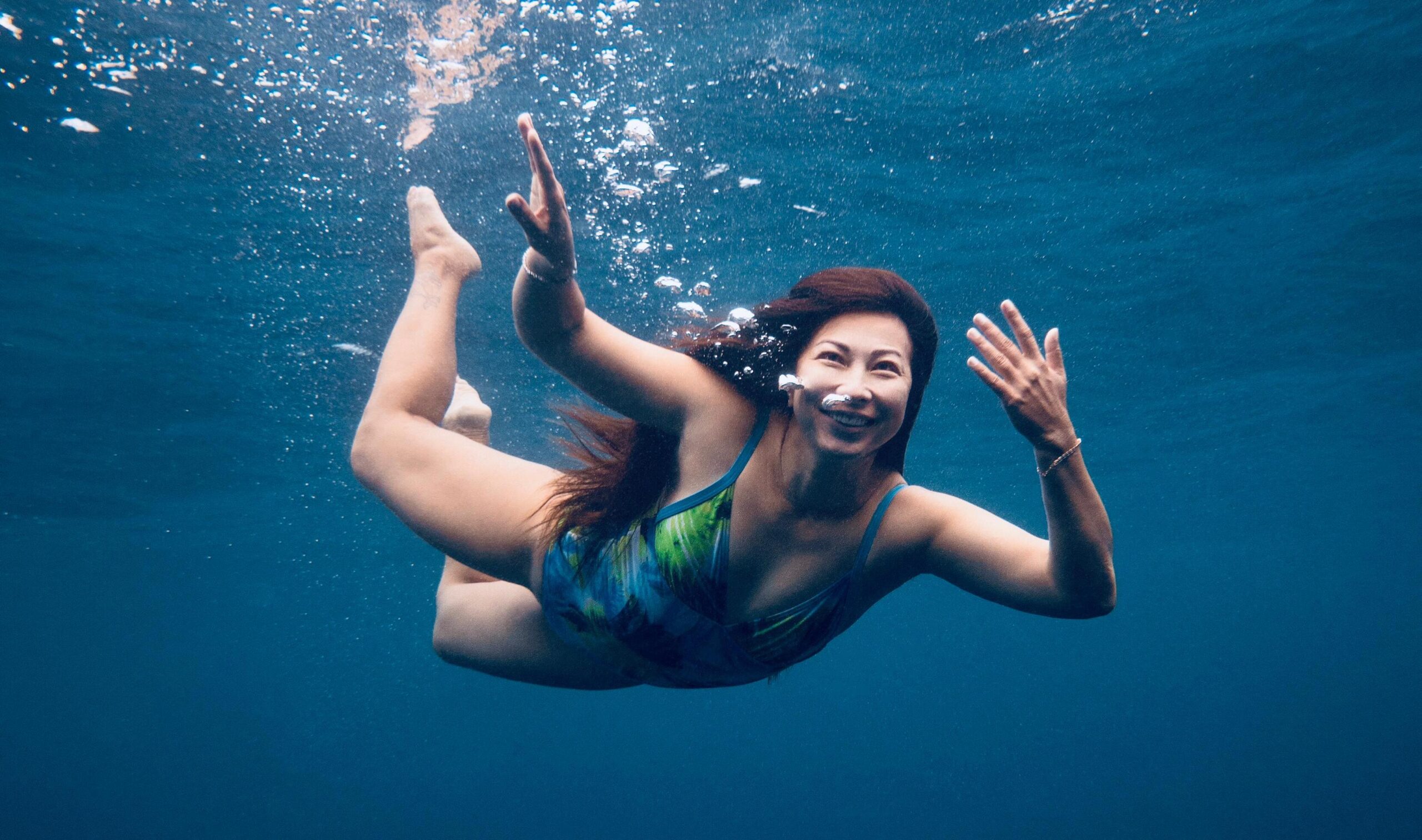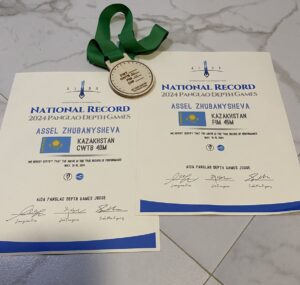ASTANA – Kazakh freediver Assel Zhubanysheva set two new national records at the 17th International Association for the Development of Apnea (AIDA) Panglao Depth Games in the Philippines on May 13-15. Zhubanysheva, who began freediving only four years ago, achieved 45 meters in Free Immersion (FIM) and 40 meters in Constant Weight Bi-fins (CWTB) disciplines, becoming the first Kazakh woman to reach these depths.

Assel Zhubanysheva. Photo credit: Zhubanysheva’s personal archieve
In an interview with The Astana Times, Zhubanysheva shared her journey and the significance of her achievements.
“I have always loved swimming, but my parents encouraged me to focus on education, so I became a clinical psychologist. By age 37, I had swum across many of Kazakhstan’s lakes. I eventually grew bored and sought something new, discovering freediving,” she said.
To set her record, Zhubanysheva trained for three months in the Philippines, focusing on techniques like proper diving form and pressure equalization.

Kazakh freediver sets two new national records including 45 meters in Free Immersion (FIM) and 40 meters in Constant Weight Bi-fins (CWTB) disciplines. Photo credit: Zhubanysheva’s personal archieve.
“On the AIDA website, where all the records are registered, I found that the last record by a Kazakh woman was 30 meters. I thought if I can dive at 45 meters or 50 meters, why not set a new record?” she said.
Zhubanysheva highlighted the importance of special training, including body stretching and thoracic flexibility, to withstand pressure at depth.
“We should have very good flexibility in the thoracic department because if our lungs are compressed and we make a sharp movement, like raising an arm quickly, it can cause barotrauma. That is why we train the upper palate, throat lock, and tongue work, so we can control them individually. In normal life, most people don’t use these techniques,” she explained.
She also stressed the necessity of mental relaxation in freediving, as divers must rely on themselves at great depths.
“A person with high anxiety can never succeed in this sport. We need a high level of body awareness to relax specific muscles during the dive to avoid injury,” said Zhubanysheva. “When we go underwater, we, as freedivers, understand where there is tension in our bodies. As you dive, you need to relax these parts because if there is tension, the deeper you dive, the more it will be traumatized. We have many techniques related to stretching and relaxation and the ability to feel the small muscles of your face. It is about having a high ability to connect with your body and negotiate with your psyche. At 50 meters, I am alone, and only I can help myself.”
Loving the sport is essential, she noted, as freediving involves enduring harsh conditions, such as jellyfish stings, waves, wind, and sun.
“If you don’t love freediving, you can’t be in the sea four times a week for two hours. You have to love it to overcome any difficulties. Weather conditions, financial constraints, and physiological challenges all come into play,” she said.
Zhubanysheva emphasized that, on a personal level, this record represents confidence and self-assertion, showing that her years of swimming have had a meaningful benefit.
“When I realized I had set a new record, I was happy and calm, inspired to continue setting records. I felt very grateful to myself, my body, my mental state, and my ability to self-organize and discipline myself. I am also grateful to the people who helped me along the way,” she added.
Zhubanysheva also discussed the financial challenges of freediving, which include costly training sessions, equipment, and competition fees.
“One training session with a coach costs $100, and I need at least two sessions with a coach per week. Training alone costs around $30 per session, requiring at least two solo workouts. I had to spend almost $300 per week. It was financially difficult, with the costs of living, renting accommodation, and equipment such as a good wetsuit or a monofin, which cost $500, adding to the burden. I even had to save money on the trainer and instructor, taking only one training session and doing a lot of training on my own. It required a lot of self-discipline and independent work, but I overcame it because I wanted to make my record,” she said.
Zhubanysheva has ambitious plans for freediving, aiming to become Kazakhstan’s absolute record holder in the sport.
“I want to break all the records in every freediving discipline in Kazakhstan. I am ready but need to train again and hire an instructor. However, this requires sacrificing money and living economically to set new records. If I had a sponsor who can support me financially, I would definitely start my training this year,” she said.
